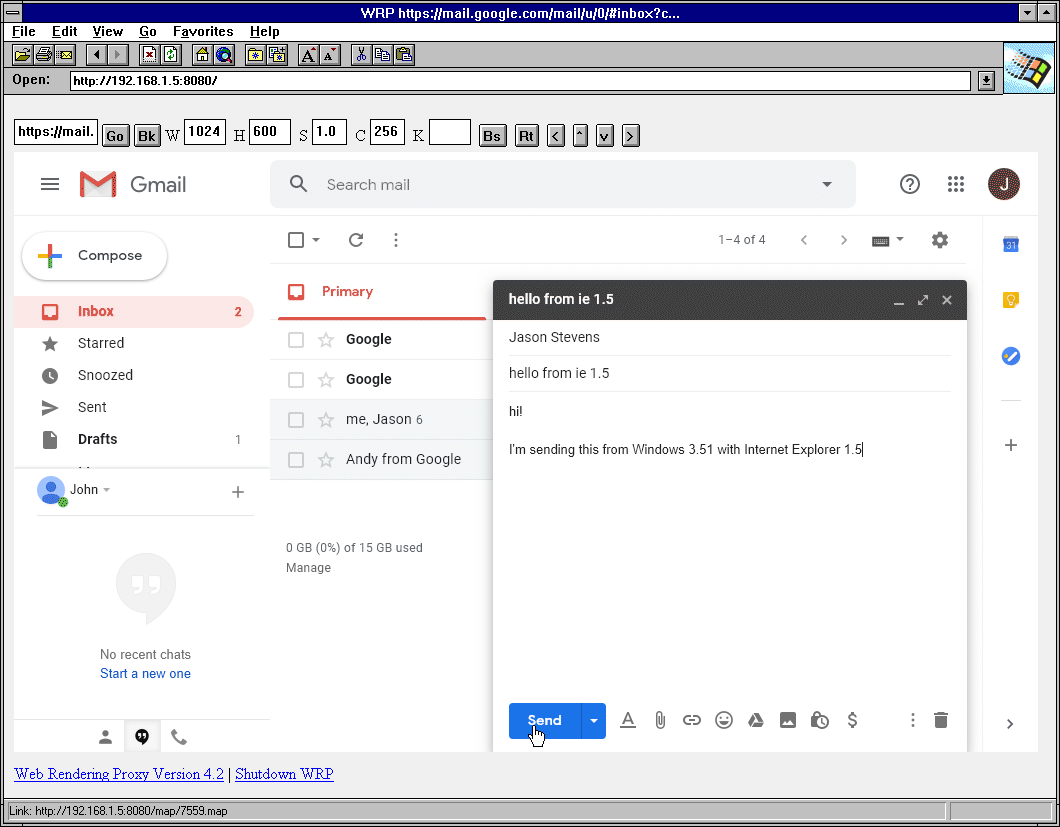mirror of
https://github.com/tenox7/wrp.git
synced 2024-11-21 19:30:48 +00:00
Web Rendering Proxy: Use vintage, historical, legacy browsers on modern web
browserchromechrome-devtoolsheadless-chromeimagemaplegacy-browsersproxyrenderingvintage-computerswebwww
| old | ||
| .gitignore | ||
| LICENSE | ||
| make.ps1 | ||
| Makefile | ||
| README.md | ||
| wrp.go | ||
| wrp.png | ||
WRP - Web Rendering Proxy
A HTTP proxy server that allows to use historical and obsolete web browsers on the modern web. It works by rendering the web page in to a GIF image. It sends mouse clicks via ISMAP and keystrokes from a text box form input.
Current Status
- This is a new version using GoLang/ChromeDP. Python/Webkit being now deprecated.
- Beta versiom, but fully supported an maintained.
- Works as browser-in-browser. A real http proxy mode is being investigated. Check issue #35 for updates.
- As of 4.1 supports clicking on non-link elements (eg. cookie warnings, dropdown menus, etc.) and sending keystrokes. Yes, you can login and use Gmail or play web based games from any old browser.
Usage
- Download a WRP binary and run it on a machine that will become your WRP server.
- Point your legacy browser to
http://address:portof WRP server. Do not set or use it as a "Proxy Server" (yet). - Type a search string or a http/https URL and click Go.
- Adjust your screen width/height/scale/#colors to fit in your old browser.
- Scroll web page by clicking on the in-image scroll bar.
- Do not use client browser history-back, instead use Bk WRP button.
- To send keystrokes fill K input box and press Go. There also are buttons for backspace, enter and arrow keys.
Flags
-l listen address:port, default :8080
-h headed mode, display browser window
-d chromedp debug logging
Minimal Requirements
WRP Server / Gateway should run on a modern hardware/os that supports memory hungry Chrome.
WRP Client / Browser needs to support forms and ISMAP. Typically Mosaic 2.0 would be minimum version for forms, although ISMAP was supported since 0.6B so you could manually enter url using ?url=....
History
- In 2014, version 1.0 started as a cgi-bin script, adaptation of
webkit2png.pyandpcidade.py, blog post. - Later in 2014, version 2.0 became a stand alone http-proxy server, also support for both Linux/MacOS, another post.
- In 2016 the whole internet migrated to HTTPS/SSL/TLS and WRP largely stopped working. Python code became unmaintainable and mostly unportable (especially to Windows, even WSL).
- In 2019 WRP 3.0 has been rewritten in Golang/Chromedp as browser-in-browser instead of http proxy.
- Later in 2019, WRP 4.0 has been completely refactored to use mouse clicks instead using a href nodes. Also in 4.1 added sending keystrokes in to input boxes. You can now login to Gmail.
Credits
- Uses chromedp, thanks to mvdan for dealing with my issues
- Uses go-quantize, thanks to ericpauley for developing the missing go quantizer
- Thanks to Jason Stevens of Fun With Virtualization for graciously hosting my rumblings
- Thanks to claunia for help with the Python/Webkit version in the past
Legal Stuff
License: Apache 2.0
Copyright (c) 2013-2018 Antoni Sawicki
Copyright (c) 2019 Google LLC
